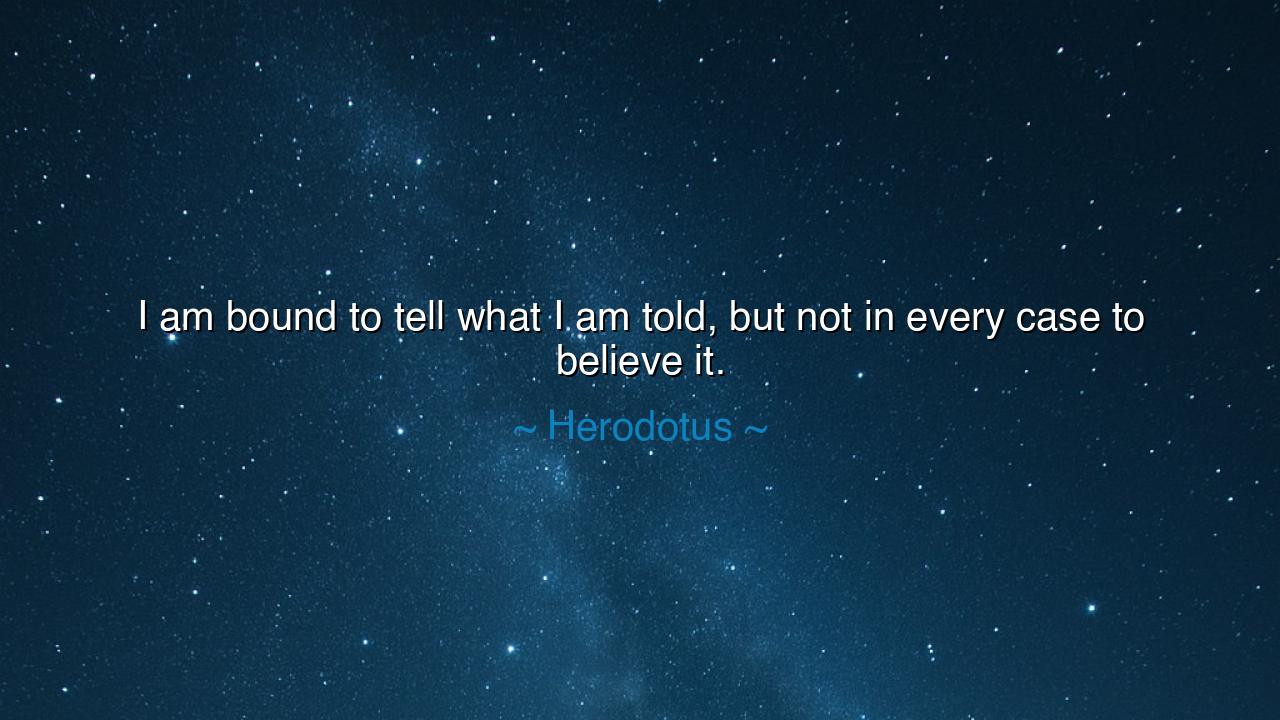
I am bound to tell what I am told, but not in every case to






"I am bound to tell what I am told, but not in every case to believe it." So spoke Herodotus, the father of history, whose task was to gather the tales of nations, kings, and battles, and to preserve them for all time. In these words, he reveals the burden of the historian: to record faithfully the stories entrusted to him, even when they are mixed with exaggeration, myth, or deceit. For the duty of the chronicler is not always to judge, but first to preserve. Yet Herodotus also warns us that belief must be tempered with discernment. One may hear, one may retell—but one must not surrender one’s reason to every tale.
The ancients understood that truth is elusive. Travelers brought back stories from distant lands—of monstrous beasts, of rivers that ran with gold, of nations who lived without war. Were these true? Who could say? Yet to record them was necessary, for in every legend lies a fragment of reality. Herodotus tells us that he was bound to report, for silence would erase memory. But he was not bound to accept blindly, for to do so would make him a slave of falsehood. His wisdom was this: preserve all accounts, but keep the mind free, questioning, discerning.
History itself bears witness to this principle. When Columbus returned from the New World, he brought tales of riches, strange peoples, and lands of wonder. Many in Europe believed all; others doubted much. Both responses were natural, yet the truth lay somewhere between. His reports were colored by ambition and misunderstanding, but still they contained glimpses of reality. If chroniclers had only recorded what they personally believed, much knowledge would have been lost. If they had believed everything, they would have preserved folly. Herodotus teaches the middle path: record faithfully, but believe cautiously.
The same can be said of the stories passed through generations. Legends of King Arthur, for example, may not be true in detail, but they reveal truths of longing, of justice, of the ideals of knighthood. If historians had dismissed them outright, a culture’s soul would have been silenced. If they had believed them wholly, history would have been distorted. Thus, the historian must be both servant and judge: a servant of memory, but a judge of belief.
The lesson for us is timeless: we too live in an age where voices shout from every corner, each bringing reports, rumors, and tales. We are bound to hear them, for they shape our world. Yet we must not be bound to believe all. The wise man listens widely, but believes cautiously. The foolish man either refuses to hear or accepts everything without question. Herodotus calls us to the balance: openness to what is told, yet freedom of thought to discern what is real.
Practically, this means cultivating both patience and skepticism. When you hear a story, do not dismiss it at once, but do not embrace it too quickly. Ask: Who is telling this? What interest might they have? What evidence supports it? Share stories if they are worth preserving, but do not surrender your mind to them unexamined. In this way, you honor both memory and reason.
So remember, children of tomorrow: "I am bound to tell what I am told, but not in every case to believe it." This is not only the creed of a historian—it is the creed of all who seek wisdom. For the world is filled with voices, each crying for belief. Listen to them, preserve their words, but keep your soul free. For truth does not always shout the loudest, nor hide in every tale, but waits for the discerning heart to recognize it.






HLHuy Le
I love how Herodotus acknowledges the tension between being a messenger and being a skeptic. In our current information age, this quote feels especially relevant—are we simply reporting what we hear, or do we take the time to verify it? How do we ensure we don’t become passive consumers of information, and instead, critically engage with what we are told?
DTThen Thi Dieu Thao
Herodotus’ perspective is fascinating because it recognizes the value in questioning what’s told to us, rather than accepting it at face value. In today’s society, where ‘fake news’ is rampant, can we trust the sources we hear from? Is it possible to be a truthful communicator and still maintain a healthy dose of skepticism? How do we navigate this delicate balance?
HPHien Pham
This quote raises a key question about the role of a storyteller or historian—do we have a responsibility to simply relay information, or should we also critically assess its truth? If we’re just telling what we’re told, is there a danger of perpetuating falsehoods? How do we find the balance between being a reliable messenger and a discerning truth-seeker?
PADo Thi Phuong Anh
Herodotus’ statement seems to highlight the importance of skepticism in storytelling and history. It’s interesting that while he feels obligated to pass on what he’s told, he doesn’t automatically believe everything he hears. In today’s world of misinformation, does this apply to how we consume news and stories? Are we too quick to believe what we hear without questioning its accuracy?